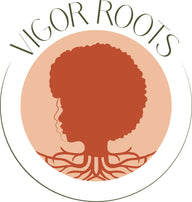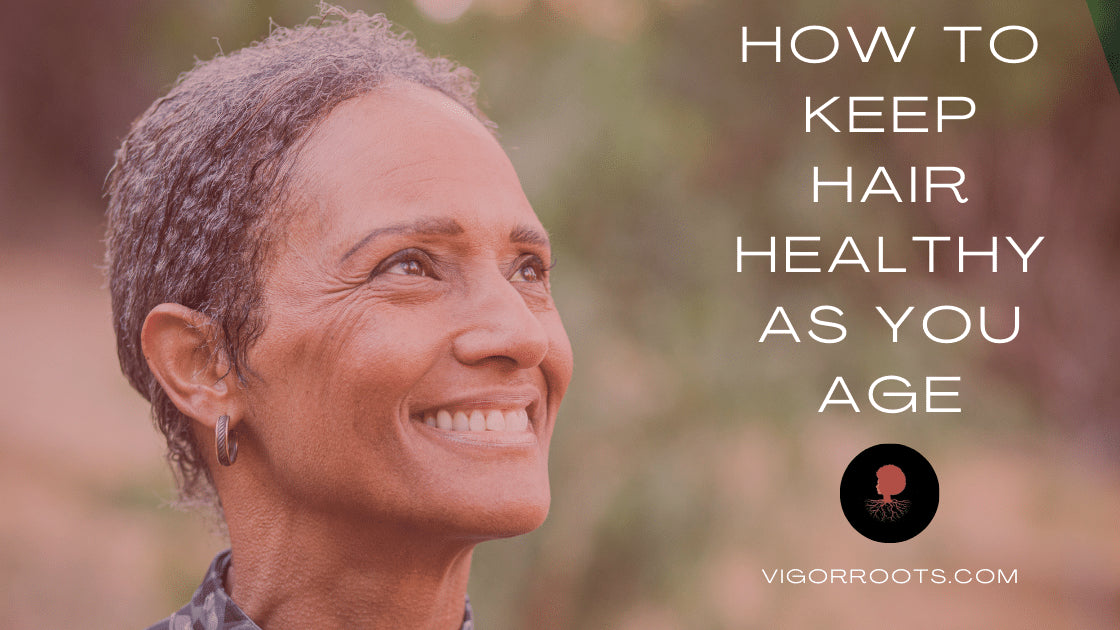
At any age, healthy hair is attractive. It’s true that as we get older, our hair will naturally start to gray and thin, but with proper care, we get to keep that healthy glow.
Unfortunately, the majority of hair care products marketed to middle-aged and senior folks are designed to disguise “problems” like grays or thinning. While chemical hair growth serums, dyes, and permanent or semi-permanent wigs might provide a short-term solution, they can actually further damage your hair and prevent strong, healthy, new hair from growing in.
In this article, we’re going to walk you through keeping hair healthy as you age- all while still looking amazing.
The Secret Is Scalp Care
For healthy hair, you need a healthy scalp.
The delicate skin on your scalp needs the same care and attention as the skin on your face.
A healthy scalp care routine includes:
- Washing and conditioning at least once a week (more if you are sweating)
- Moisturizing with a nourishing serum 3-5 times a week if you’re of middle age or older (more if you are experiencing hair thinning or scalp issues)
“It’s not a cumbersome or bothersome routine. It’s just like brushing your teeth,” promises Lynette Epps, a friend of Vigor Roots and former stylist rocking some beautiful, full hair.
And just like you wouldn’t use any old soap on your face, you should take care that the products you use on your hair won’t irritate your scalp. We recommend always scanning through the ingredients before making a purchase.
Natural, plant-based hair care products tend to be gentler on the scalp. Be careful with the mass-produced hair care products in chain stores and grocery aisles: many contain harsh chemicals that can irritate and dry out the scalp.
Bottom line: your scalp should be comfortable. Itching, dryness, flaking, etc. should always be addressed. Make sure to consult with your stylist or doctor when you are experiencing scalp issues.
It’s Never Too Late For Scalp Care
If you didn’t know this was how you were supposed to be caring for your scalp, no shame. A lot of us were never taught! For a long time, popular hair care focused on the shape and shine of the hair- not necessarily the health of the scalp.
So, if you’re a grown adult and have yet to adopt a scalp care routine, just know it’s never too late to start one. Even if- especially if- your hair is thinning now.
Just like we start to get wrinkles and our complexions evolve as we get older, our scalps require more attention as we age as well.
Epps warns that people of middle age and older should be especially vigilant for dryness of the scalp. A dry scalp can lead to brittle, breakable hair unless it gets the moisture it needs.
Similarly, if you notice a widening part, thinning edges, or your hair breaking off- it’s time to get serious about scalp care. Make sure you’re following good hair hygiene, using products that don’t irritate your scalp, and that you make moisturizing a daily habit.
Don’t Assume Hair Loss Makes Your Scalp a Lost Cause
Don’t assume that just because your hair is currently balding that there is no possibility of it ever growing again. Yes, sometimes there are medical and hereditary reasons for baldness. But, sometimes, it’s just poor scalp care.
Before you decide that your hair is gone and not coming back, go see a dermatologist and talk to your stylist. It’s entirely possible that a scalp care regimen could invite new hair growth.

Regardless of the hair you have or don’t have, it’s important to take care of your scalp. A healthy scalp grows healthy hair or looks great bare.
Bald is beautiful. Especially when the skin of the sclap is properly moisturized and protected from sun damage with a good SPF.
Fixing “Problems” Might Be Causing More of Them
As tempting as it can be to dive right for the Rogaine, dye, or permanent wig to remedy your hair insecurities, these popular methods can actually make it harder for you to grow new, healthy hair.
Here are a few ideas on what to do instead.
Alternatives to Rogaine
While chemical solutions like Rogaine may help certain people regrow hair- the results might not be super comfortable. The alcohol in the topical solution can dry out and irritate the sensitive skin of the scalp. Further, hair shedding may increase, and, if your scalp is unhealthy, new hair growth will be brittle and breakable.
Consider a nourishing, plant-based hair growth serum instead. Again, scan through the ingredients and make sure that they are soothing for the skin of the scalp. Also, watch out for harsh chemicals that can cause scalp irritation like parabens, formaldehyde, and alcohol (if it’s listed in the first four ingredients). We recommend our Root22Serum, powered by 22 organic, plant-based hair growth stimulants.
Remember, when your hair growth serum addresses the root cause of hair thinning- poor scalp health- you’re getting a more holistic, long-lasting treatment.
“Healthy hair looks good. I don’t care what color it is. I don’t care what texture it is. Taking care of it just makes sense,” says Epps.
Alternatives to Dye
Society has really done a number on all of us. We’re all so pressured to freak out at the sight of a gray and immediately subject our hair to harsh, chemical dyes.
First off, gray hair and white hair are gorgeous. Period. You don’t need to cover it up to look simply smoldering. (“Silver fox” is a term for a reason.)
“When you can embrace the gray, you’re going to look beautiful and healthy in your gray,” says Epps.
But, no judgment. Dyed hair is also a perfectly valid and fabulous form of expression! But it should be because you want to dye your hair, not because you feel like you need to.
So, if you want to rock dyed hair you have options for doing it in a healthy way.
Firstly, we strongly recommend you have a stylist dye your hair rather than trying to do it yourself. A skilled stylist will use the products that are right for your hair type and they’ll have the knowledge to properly process your hair without causing unnecessary damage.
Do be warned, dyes and bleach are likely to dry out and irritate your scalp, especially as you age. So, if you’re going the colored hair route, be prepared to amp up your scalp care routine.
“I don’t know any situation where you can continually dye as you’re getting older and not deplete your hair,” says Epps.
If you’re going to do it, you’ll definitely need to moisturize daily and visit your stylist more regularly for maintenance and deep conditioning treatments.
Another way to minimize the risk of harming your scalp is to use a natural dye like henna. Henna is a plant-based dye that has been used on hair and skin for thousands of years. Though it won’t dye your hair a shocking, unnatural shade, it can be used to darken your grays and give your hair a nice shine.
Henna also has antifungal, antimicrobial, and anti-inflammatory properties, which is great for anyone who suffers from dandruff.
However, as with all hair products, read the ingredient label. Aim for organic henna dye that does not contain harsh chemical preservatives.
Alternatives to Permanent Wigs
As good as they look, permanent and semi-permanent wigs make proper scalp care impossible.
Remember, your hair and scalp need to be washed and conditioned at least once a week. If you go longer, dirt, environmental debris, product buildup, and natural oils are likely to clog the pores, cause irritation, and inhibit the growth of healthy hair. Your scalp is also likely to get very itchy and uncomfortable.
Instead, consider wigs that can be removed nightly. That way, you can maintain your regular wash regimen as well as gently detangle your hair and moisturize your scalp each night.
There’s no need to have to choose between a wig and healthy hair! You can have both.
Style Gently
As we age, it’s important to treat our hair with the respectful gentleness it deserves.
You might want to limit how often you brush your hair, and take care that you are using the right brush for your hair type. “A brush is really taxing on the hair,” Epps explains. “The wrong brush can pull it out.”
Since your hair strands get more fragile as you age, it’s important to avoid styling that can cause them to break off.
Epps also cautions against any hairpieces that need to be adhered directly to your scalp, as this can pull out your existing hair. If you want to wear a piece, go for a ponytail or bun. Nothing too heavy though.
She also recommends ditching the curling iron and other heat styling tools. “Avoid excessive heat,” she says. “The heat is destroying the hair. It shouldn’t be an every day or even every other day thing. Go back to the old-fashioned way of rollers.”
Also, make sure to give your hair more frequent breaks from tension styles like box braids or twists. Vigor Roots CEO Nathalee DuRose recommends that middle-aged and senior people leave protective styles in no longer than 3 weeks and then take a 2-4 week break before wearing a new tension style.
Sleep Soundly With Protected Hair
One often overlooked aspect of good hair health is a good night’s sleep- with your hair covered.
Before bed, make sure to detangle your hair and cover it with a satin bonnet, so your strands won’t catch and mat or tear on your bedding.
It’s also a good idea to apply a nourishing scalp serum before donning your bonnet so that your scalp can get a deep moisturizing treatment as you sleep.
“That sleep you’re going into is the time that your body will use to rest and heal and grow and will use whatever nutrients it has. It’s important to give it the right nutrients to work with so your body does its job while sleeping,” says Epps.
Love What You’ve Got
It’s easiest to nurture your hair when you love the hair you have. It’s important to work on your self-esteem for the natural state of the top of your head. That way, you won’t be tempted into harsh processes and quick fixes that harm your scalp and leave you with damaged hair.
Get that healthy glow. You look amazing.
Lock in the moisture and long-term hair health with Root22Serum- an all-natural scalp serum for strong roots and luscious hair.

